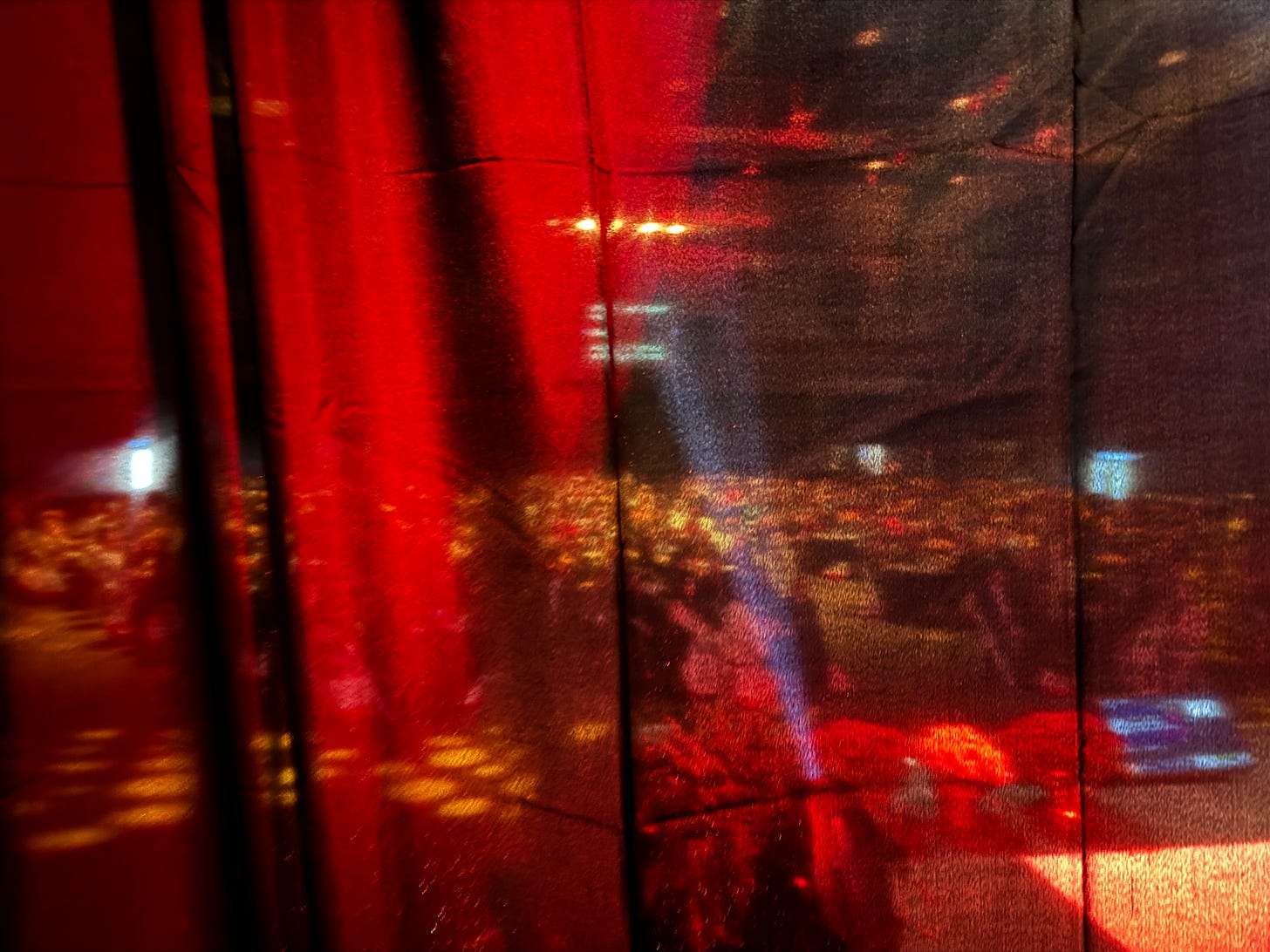🌤️ Head in the Clouds, Part Three
🙏 Friendly reminder! Please take a moment to answer this short 3-question reader survey. We are up to 12 responses so far; I’d be grateful if you could help hit 35 (1% of Doh readers) ☺️
Catch up on part one and part two first:
“Resonance has moments that are so amazing they can best be described as sacred. When you have resonance, your performance is effortless, and the outcome takes care of itself.”
—Jim Murphy, Inner Excellence

Where we left off . . .
By the time I stepped off the plane, I felt that peace and presence, just as Jim Murphy promised. I reminded myself: there’s only ever one wish. I recited my usual prayer for the days leading up to a keynote: Make me a messenger. Help me deliver what this room of beautiful people most needs to hear right now.
But adrenaline in the body can do funny things when stepping onto an arena-sized stage. Scott Berkun captures it perfectly in his book, Confessions of a Public Speaker:
“Our brains, for all their wonders, identify the following four things as being very bad for survival:
—Standing alone
—In open territory with no place to hide
—Without a weapon
—In front of a large crowd of creatures staring at youIn the long history of all living things, any situation where all the above were true was very bad for you. It meant the odds were high that you would soon be attacked and eaten alive. Many predators hunt in packs, and their easiest prey are those who stand alone, without a weapon, on a flat area of land where there is little cover (e.g., a stage). Our ancestors, the ones who survived, developed a fear response to these situations.”
“Expect nothing” helped me overcome my self-centeredness en route to the event. But would it help when I needed it most? Would it work once I stepped onto that big stage, under the bright lights and with two thousand eyeballs pointed expectantly in my direction?
When I first met one of my besties, , over a decade ago, he often repeated his favorite mantra, one strengthened after spending a month meditating in a Thai monastery: “Keep your head in the clouds, and your feet on the ground.”
I still smile when he says it. Adam is a visionary—a powerful dreamer—and it’s easy for both of us to live in the clouds sometimes.1 But it’s hard to make a home or a solid business there, and besides, midlife challenges certainly have a way of humbling those boots right back down into the dirt. It reminds me of the now-cliché Thoreau-ism (that I’ve admittedly quoted in my books):
“If you have built castles in the air, your work need not be lost; that is where they should be. Now put the foundations under them.”
That’s what resonates within Jim Murphy’s message: striving for excellence isn’t about tearing down those visions of castles in the air; what gets us in trouble is becoming attached to what they look like or what they’ll do for us once we build them. The crux of Jim’s work is inner excellence, aiming for what he posits we really want, “beyond our tangible goals and pursuits,” which is “to feel totally alive.”
Fear takes us farther from that feeling. It puts the focus back on the me-me-me of attachment. Jim describes the experience of resonance as being “fully engaged in the moment, with a clear mind and unburdened heart.” Emphasis mine:
Extraordinary performance is merely a subset of extraordinary experience; great results are the byproduct of resonance. The key to extraordinary performance, then, is to build on a foundation that creates the conditions for resonance.”
For Jim, that foundation comes from four daily process goals:2
Give my best (100% of what I have today)
Be present
Be grateful
Focus on my routines and only what I can control
I cannot control the outcome of a speech, nor the impact. I can only ever do my best. When I focus on the outcome, worrying in advance about whether people will like me or not, I enter a state of fear, anxiety, and self-obsession. When I shift my focus to service, to how grateful I am to get to do something so meaningful at all, I am present.
I have been speaking in front of groups of varying sizes for almost twenty years; twenty-five if you count high school graduation. Still, to this day, I cannot totally control what my nerves do when I step on stage. Sometimes my heart palpitates and my voice quakes just introducing myself in front of a room of ten people—even when I’m not the one facilitating, just participating. Something as casual as saying my name and background at a business meet-up might send my heart rate spiking.
Sometimes my leg shakes. Sometimes my neck and chest break out in hives. I never quite know what I’m going to get. I remind myself that these speaking fears are natural, even primal (as per Berkun, quoted above). That alone helps calm the adrenaline; believing it’s bad, noticeable, or unnatural only creates a vicious cycle, accelerating its production and physical impact further.
So, alongside these years of practice, I chalk it up to pure grace when I step in front of a group of any size without losing my cool, without forgetting my words, and while remembering to have fun. This peace comes from somewhere bigger than me, something that transcends the clouds.
The day before the keynote, we did a five-hour tech test at the arena. Nothing worked as planned: not the teleprompter, not the media in my slides, not the confidence monitors, not the interactive elements (via a tool called Menti).
I did not feel good about anything, really, by the time I went to bed that night. I was not confident whatsoever. I was the kick-off speaker, so if anything did go wrong, I’d be the first to know—and the first to flub.






